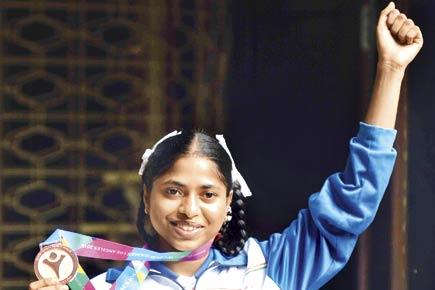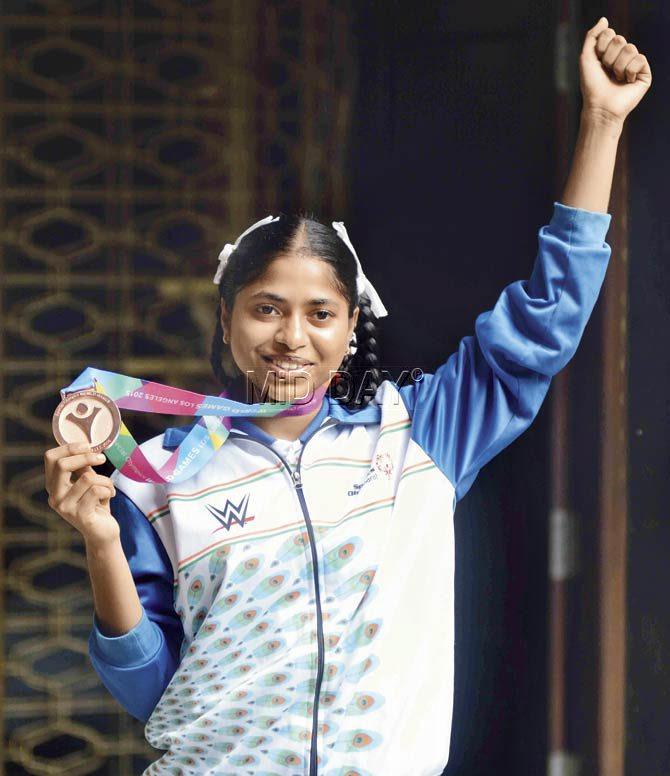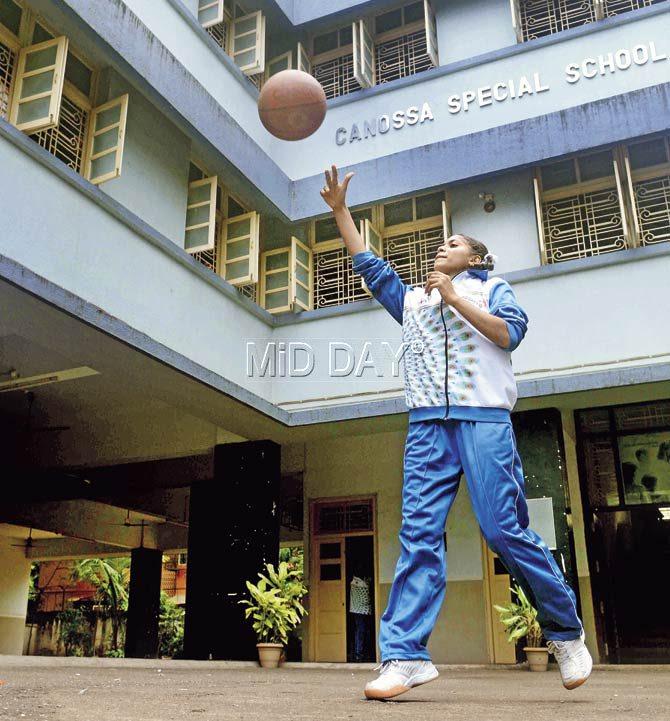Fatima Rodrigues had an IQ of 55-60 and she was either ignored or ridiculed by people of her locality; seven years later, Fatima wins bronze in the Special Olympics in Los Angeles

Ever since 17-year-old Fatima Rodrigues won a basketball bronze medal at the recently concluded Special Olympic World Summer Games 2015 in Los Angeles, she and the circular piece of metal have been inseparable. She sleeps with the medal, carries it to her school everyday, and keeps it in her pocket for the rest of the day.
ADVERTISEMENT

Fatima with her beloved bronze medal, which she has been inseparable from. Pics/Atul Kamble
For Fatima, the medal is not just a mark of achievement; it is her identity. It signifies her triumph over all odds. The Indian basketball team which competed as Bharat, scored 37 points to bag bronze in the F.03 category of the basketball event of the Special Olympics, while Nippon Female (Japan) won gold. The categories depend on the ability of players.

Fatima in action at the Canossa Special School in Mahim
At the age of 10, Fatima’s parents found out that she had a low Intellectual Quotient (between 55 and 60) and her life took a turn for the worse. But winning the bronze medal changed everything. From being ignored, neglected and treated like a ‘mental case’ in her neighbourhood, Fatima is now a much sought-after girl, whom everyone wants to know.
Well-deserved fame
Fatima returned home from the United States on August 5, “Everybody wants to talk to me now. They (relatives, friends and people in the neighbourhood) want to click photos with my medal. I have never experienced so much attention in my life before,” she says with a twinkle in her eyes as we chat during a break at Canossa Special School, Mahim.
“The medal has given me tremendous self-belief and confidence. I am now confident that I can live life the way I want to,” adds Fatima, who wants to excel in sports and aims to be a coach after her playing days.
Fatima was brought to Canossa Special School seven years ago.
Until then, she was attending a school for normal children. “She would either hide her books or throw them away. The principal requested us to admit her to another school. We were clueless as to why she was behaving like this,” says Fatima’s mother Louiza, who works as a sweeper in a bank at Kurla and also does odd jobs to make ends meet.
The parents decided to get Fatima admitted to a boarding school in Panvel, but she was asked to leave from there too. When she was 10, Fatima’s father, Robert, decided to approach Canossa Special School, where he works as a bus driver.
“They asked us to conduct a few tests at Sion Hospital. That’s when we came to know that she is a special child,” says her mother. Junita Rodricks, Fatima’s teacher and mentor at Canossa Special School, sympathises with her ward.
“Since Fatima has no facial scars like other mentally-challenged people, she found it more difficult to find acceptance in society. Looking at her, it is hard to make out that she is challenged mentally,” says Rodricks.
Nightmare
That phase was nightmarish for her parents, especially when it came to dealing with people in their Christian Gaon locality of Kurla. “People would talk rubbish. They would say she is a mental case. We would feel terrible. We stopped sending our daughter out and also avoided keeping contact with anyone,” the mother says, holding back her tears.
“But now, the same people want to talk to Fatima. They are also planning a felicitation function for her at the Holy Cross church in Kurla. There are plans to put up hoardings of her in the area too,” she adds, as moist eyes give way to pride. “Fatima is the first in our family’s history to go to America,” said the proud mother.
As our photographer clicks a few frames of Fatima with her medal outside their humble dwelling, a few people stop to congratulate Fatima. She is the “heroine” of their chawl. Fatima holds the medal upright, flashing the ‘victory sign’, a gesture she learnt from other athletes in the US. It’s also a sign that reminds her that her life has changed forever.
 Subscribe today by clicking the link and stay updated with the latest news!" Click here!
Subscribe today by clicking the link and stay updated with the latest news!" Click here!






